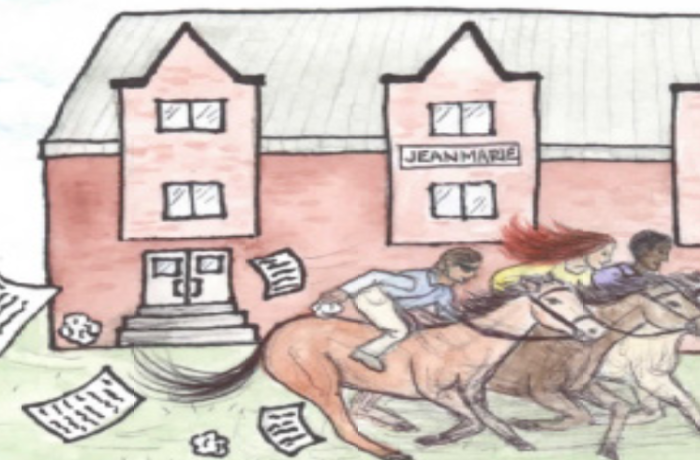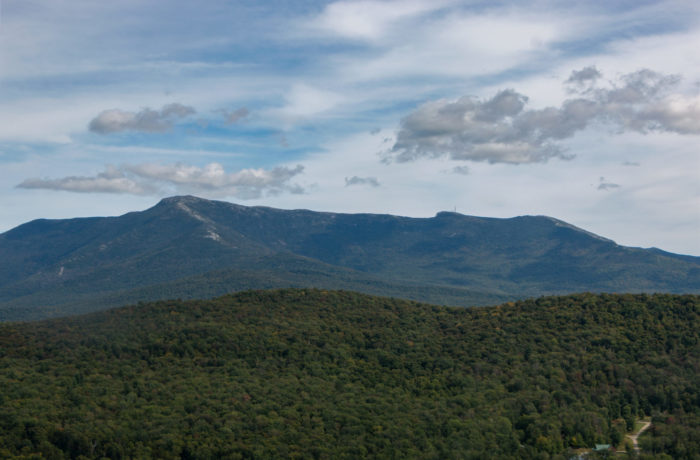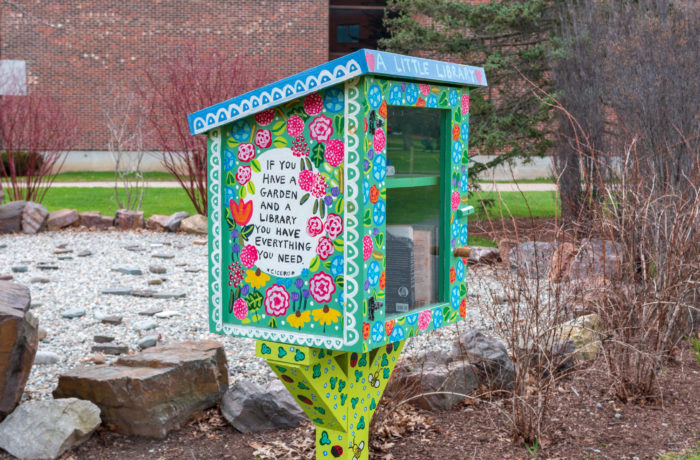
The first snow in October surprised President Lorraine Sterritt, who took office in 2018. After living in North Carolina for the last several years, she rushed to the Alpine Shop for a winter coat. After selecting the perfect parka she began chatting with the cashier, easily striking up a conversation as she does with most people.
“What brought you to Vermont?” the cashier asked.
“St. Michael’s College,” Sterritt replied.
“Oh, I’m applying there!” the cashier said. So Sterritt nominated her in the recent Nominate A Knight Challenge, one of the many programs Sterritt helped instate this semester, in the beginning phase of her original promise to “recruit, recruit, recruit.”
“Everywhere I go I run into people and we get chatting and it turns out they’re somehow connected to St. Michael’s. Let’s get the people who really know what a St. Michael’s education is like talking with prospective students and telling them why they should be taking a look at St. Michael’s,” Sterritt said.
The Defender caught up with the president on highlights from this semester and plans for the those ahead.
Q: Everyone is talking about the hands on approach you’ve taken so far. You’re visible on campus. Why is this important to you?
It’s my natural instinct to just to be a friendly kind of person. I’m Irish. We are chatty people. I also feel it’s critically important in the role of a president of an educational institution. There’s absolutely no substitute for face-to-face contact with people and being visible.
Q: The addition of three new majors in public health and health sciences was the first news to come out of your office. What was your proudest moment this semester?
When the trustees just were wildly ecstatic about it, and on the spot they pledged a million dollars of their own money. I have never before seen a trustee meeting where a million dollars is raised on the spot. That was an enormous vote of confidence in the institution, and for these new majors which support for the student experience. It’s a win, win, win, win, because it will help us to attract students, it leads to gainful employment for our students, it’s based on serious science, and it’s a service to humanity.
Q: Despite your initial success, you did arrive to the college at a pretty scary time, not just for us but for lots of small liberal arts colleges. You adopted a budget deficit and shrinking enrollment. To my knowledge the college’s deficit for FY18 was $1.1 million. Do you know where it stands now?
It’s under 1 million dollars. That’s been a huge priority to reduce the deficit, and we will.
Q: How?
Very careful budget management, not spending when we don’t have to. That’s a balancing act because we never want to cut something that will then have a big negative impact on the student experience.
Q: What can students expect to lose from budget cuts?
Right now what we’re focused on is what we’re adding actually, like the public health major. What else would serve our students really well? I’m really big on the both the intrinsic value of the academic experience and career preparation. I don’t expect to raise a million dollars in every meeting, so that’s part of what I have to balance. Are there programs that we could be offering right now that that don’t have a huge expense attached to them?Are there programs that we could be offering that do have expense attached to them and that we then need to fundraise for?
Q: Dwindling enrollment is a huge concern for all the small colleges. How does St. Michael’s like stay competitive knowing that other colleges are doing similar things?
Yes, I think they all are doing similar things, because small colleges are all in the same boat. We’re doing careful analysis on what will serve our students and the college. The good news is that our enrollment went up this year.
Q: By how much?
As of October 15, the first year cohort has 478 students. That includes transfer students, first year students and international students.
Q: What would make a senior in college want to choose St. Michael’s over others?
We’re not the only college that has strong academics, but what I see in St. Michael’s, and this is one of the things we’ve tried to capture in new branding materials, is the what I call the combination of head and heart through really strong academics and really strong emphasis on service.
Q: Why would an 18-year-old senior in high school who is thinking ‘I’m going to cure cancer, and design new drugs, and revolutionize healthcare’ pick St. Michael’s over a giant research university?
Often what it comes down to is the sheer amount of individual attention you get in a small college as opposed to a giant research university. No matter how independent you are or how smart you are there’s going to be an added layer with the kind of care goes on in a small college [and] that’s priceless.
I mean that both in the academic context, but also in the community. Whether it’s an alum from the 1940s or an alumni from 2018, they have maintained friendships with St. Michael’s classmates all this time.
Q: There are tons of other colleges with the same ingredients: small, Catholic, in the Northeast. What makes St. Michael’s students have this special experience?
Sincerity. I attribute a great deal to the Edmundites who founded the school. What they represented in the founding of this school, that’s what makes us distinctive. That spirit permeates everything.
Q: How can the college show prospective students that?
What we’re capturing in these materials is a piece of the academics, a piece of the service, a piece of the wonderful location that we’re in. You need knowledge in your head, but at the same time you’re being formed as a human being who with that knowledge, makes a difference in the world.
Q: Aside from the school offering new programs and new branding, what are other ways you’re trying to mobilize people to bring new students in?
One other thing that we’re working on is diversity across all our constituencies. I think there’s a strong feeling on our campus that we could be more diverse, so we’re looking at how to increase the diversity of each of our populations and to ensure that we are an inclusive campus.


